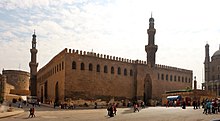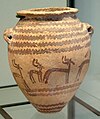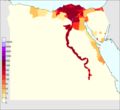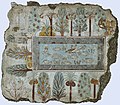Egypt Arabic : مصر Miṣr [mesˁr] Egyptian Arabic pronunciation: [mɑsˤr] Arab Republic of Egypt , is a transcontinental country spanning the northeast corner of Africa and the Sinai Peninsula in the southwest corner of Asia . It is bordered by the Mediterranean Sea to the north , the Gaza Strip of Palestine and Israel to the northeast , the Red Sea to the east, Sudan to the south , and Libya to the west . The Gulf of Aqaba in the northeast separates Egypt from Jordan and Saudi Arabia . Cairo is the capital and largest city of Egypt , while Alexandria , the second-largest city, is an important industrial and tourist hub at the Mediterranean coast . At approximately 100 million inhabitants, Egypt is the 14th-most populated country in the world , and the third-most populated in Africa.
Egypt has one of the longest histories of any country, tracing its heritage along the Nile Delta back to the 6th–4th millennia BCE. Considered a cradle of civilisation , Ancient Egypt saw some of the earliest developments of writing, agriculture, urbanisation, organised religion and central government. Egypt was an early and important centre of Christianity , but largely adopted Islam in the seventh century. Cairo became the capital of the Fatimid Caliphate in the tenth century, and of the Mamluk Sultanate in the 13th century. Egypt then became part of the Ottoman Empire in 1517, before its local ruler Muhammad Ali established it as an autonomous Khedivate in 1867. The country was then occupied by the British Empire and gained independence in 1922 as a monarchy . Following the 1952 revolution , Egypt declared itself a republic , and in 1958 it merged with Syria to form the United Arab Republic , which was dissolved in 1961. Egypt fought several armed conflicts with Israel in 1948 , 1956 , 1967 and 1973 , and occupyed the Gaza Strip intermittently until 1967. In 1978, Egypt signed the Camp David Accords , which recognised Israel in exchange for its withdrawal from the Sinai. After the Arab Spring , which led to the 2011 Egyptian revolution and overthrow of Hosni Mubarak , the country faced a protracted period of political unrest ; this included the election in 2012 of a brief, short-lived Muslim Brotherhood -aligned Islamist government spearheaded by Mohamed Morsi , and its subsequent overthrow after mass protests in 2013 .
Egypt is considered to be a regional power in North Africa , the Middle East and the Muslim world , and a middle power worldwide. It is a developing country having a diversified economy, which is the largest in Africa , the 38th-largest economy by nominal GDP and 127th by nominal GDP per capita. Egypt is a founding member of the United Nations , the Non-Aligned Movement , the Arab League , the African Union , Organisation of Islamic Cooperation , World Youth Forum , and a member of BRICS . (Full article...
The following are images from various Egypt-related articles on Wikipedia.
Image 1 The
Temple of Dendur , completed by 10 BC,
Metropolitan Museum of Art (New York City) (from
Ancient Egypt )
Image 2 The
Qattara Depression in Egypt's north west (from
Egypt )
Image 3 Al-Azhar Park is listed as one of the world's sixty great public spaces by the
Project for Public Spaces . (from
Egypt )
Image 4 Tourists riding an
Arabian camel in front of
Pyramid of Khafre . The
Giza Necropolis is one of Egypt's main tourist attractions. (from
Egypt )
Image 5 The
Suez Canal (from
Egypt )
Image 6 The High Court of Justice in
Downtown Cairo (from
Egypt )
Image 8 The
Book of the Dead was a guide to the deceased's journey in the afterlife. (from
Ancient Egypt )
Image 9 The
Fayum mummy portraits epitomize the meeting of Egyptian and Roman cultures. (from
Ancient Egypt )
Image 10 Egyptian honour guard soldiers during a visit of U.S. Navy Adm. Mike Mullen (from
Egypt )
Image 12 The pharaoh was usually depicted wearing symbols of royalty and power. (from
Ancient Egypt )
Image 14 Arabic calligraphy has seen its golden age in
Cairo . This adornment and beads being sold in
Muizz Street (from
Culture of Egypt )
Image 15 Smoke rises from oil tanks beside the
Suez Canal hit during the initial
Anglo-French assault on Egypt, 5 November 1956. (from
Egypt )
Image 16 Napoleon defeated the
Mamluk troops in the
Battle of the Pyramids , 21 July 1798, painted by
Lejeune . (from
Egypt )
Image 17 The
Giza Necropolis is the oldest of the
ancient Wonders and the only one still in existence. (from
Egypt )
Image 18 Egypt under Muhammad Ali dynasty (from
Egypt )
Image 19 Painted limestone relief of a noble member of Ancient Egyptian society during the New Kingdom (from
Ancient Egypt )
Image 20 Prominent Egyptian dissident
Alaa Abd El-Fattah was sentenced to five years of imprisonment in December 2021. (from
Egypt )
Image 21 Kushari , one of Egypt's national dishes (from
Egypt )
Image 22 The
Eastern Imperial Eagle is the national animal of Egypt. (from
Egypt )
Image 23 Protesters from the Third Square movement, which supported neither the former Morsi government nor the Armed Forces, 31 July 2013 (from
Egypt )
Image 24 Soad Hosny , film star (from
Egypt )
Image 26 Illustration of various types of capitals, by
Karl Richard Lepsius (from
Ancient Egypt )
Image 28 President el-Sisi with US President
Joe Biden , 11 November 2022 (from
Egypt )
Image 29 Four colossal statues of
Ramesses II flank the entrance of his temple
Abu Simbel (from
Ancient Egypt )
Image 30 The
Al-Hakim Mosque in Cairo, of
Al-Hakim bi-Amr Allah , the sixth caliph, as renovated by
Dawoodi Bohra (from
Egypt )
Image 31 The Weighing of the Heart from the
Book of the Dead of Ani (from
Egypt )
Image 34 A figure wearing the red crown of Lower Egypt , most probably
Amenemhat II or
Senwosret II . It functioned as a divine guardian for the
imiut ; the divine kilt, suggests that the statuette was not merely a representation of the living ruler. (from
Ancient Egypt )
Image 35 Sennedjem plows his fields in
Aaru with a pair of oxen,
Deir el-Medina (from
Ancient Egypt )
Image 36 Hunting game birds and plowing a field, tomb of
Nefermaat and his wife
Itet (
c. 2700 BC ) (from
Ancient Egypt )
Image 37 Temple of Derr ruins in 1960 (from
Egypt )
Image 38 British infantry near
El Alamein , 17 July 1942 (from
Egypt )
Image 39 Egyptian literacy rate among the population aged 15 years and older by UNESCO Institute of Statistics (from
Egypt )
Image 42 Khafre enthroned (from
Ancient Egypt )
Image 43 Egyptian President
Gamal Abdel Nasser in Mansoura, 1960 (from
Egypt )
Image 44 Smart Village , a business district established in 2001 to facilitate the growth of high-tech businesses (from
Egypt )
Image 45 A typical
Naqada II jar decorated with gazelles (Predynastic Period) (from
Ancient Egypt )
Image 47 Egypt is the eighth most water stressed country in the world. (from
Egypt )
Image 48 Early tomb painting from
Nekhen ,
c. 3500 BC , Naqada, possibly Gerzeh, culture (from
Ancient Egypt )
Image 49 Hatshepsut's trading expedition to the
Land of Punt (from
Ancient Egypt )
Image 50 Women in Cairo wear face masks during the
COVID-19 pandemic in Egypt in March 2020. (from
Egypt )
Image 51 Glassmaking was a highly developed art. (from
Ancient Egypt )
Image 52 The Ptolemaic Queen
Cleopatra VII and her son by Julius Caesar,
Caesarion , at the
Temple of Dendera (from
Egypt )
Image 53 Tutankhamun charging enemies on his
chariot , 18th dynasty. (from
Ancient Egypt )
Image 54 Salah Zulfikar , film star (from
Egypt )
Image 55 The
Egyptian Museum of Cairo (from
Egypt )
Image 56 The
Edwin Smith surgical papyrus describes anatomy and medical treatments, written in
hieratic ,
c. 1550 BC (from
Ancient Egypt )
Image 57 Tanoura dancers performing in Wekalet El Ghoury, Cairo (from
Egypt )
Image 58 Cairo grew into a
metropolitan area with a population of over 20 million. (from
Egypt )
Image 59 Naguib Mahfouz , the first Arabic-language writer to win the
Nobel Prize in Literature (from
Egypt )
Image 60 Ancient Egyptians playing music (from
Egypt )
Image 61 Measuring and recording the harvest, from the tomb of
Menna at
Thebes (Eighteenth Dynasty). (from
Ancient Egypt )
Image 62 An offshore platform in the Darfeel Gas Field (from
Egypt )
Image 63 Hieroglyphs on stela in
Louvre , c. 1321 BC (from
Ancient Egypt )
Image 64 Green irrigated land along the Nile amidst the desert and in the delta (from
Egypt )
Image 65 Seagoing ship of an expedition to Punt, from a relief of
Hatshepsut's Mortuary temple , Deir el-Bahari (from
Ancient Egypt )
Image 66 Egyptian tanks advancing in the Sinai desert during the
Yom Kippur War , 1973 (from
Egypt )
Image 67 Menna and Family Hunting in the Marshes, Tomb of Menna,
c. 1400 BC (from
Ancient Egypt )
Image 68 Egypt's population density (people per km
2 ) (from
Egypt )
Image 69 Coffin of Khnumnakht in 12th dynasty style, with palace facade, columns of inscriptions, and two Wedjat eyes (from
Ancient Egypt )
Image 70 The Cairo Metro (line 2) (from
Egypt )
Image 71 The
pyramids of Giza are among the most recognizable symbols of ancient Egyptian civilization. (from
Ancient Egypt )
Image 72 Hosni Mubarak was the president of Egypt from 1981 until his overthrew in 2011 (from
Egypt )
Image 73 Anubis , the god associated with mummification and burial rituals, attending to a mummy. (from
Ancient Egypt )
Image 74 Lower-class occupations (from
Ancient Egypt )
Image 76 The gods
Osiris ,
Anubis , and
Horus in the tomb of Horemheb (
KV57 ) in the Valley of the Kings. (from
Ancient Egypt )
Image 77 The
Narmer Palette depicts the unification of the Two Lands. (from
Ancient Egypt )
Image 78 Wooden figures of soldiers, from the tomb of nomarch
Mesehti (
11th dynasty ) (from
Ancient Egypt )
Image 79 Ruins of Deir el-Medina (from
Ancient Egypt )
Image 80 Rectangular fishpond with ducks and
lotus planted round with date palms and fruit trees,
Tomb of Nebamun , Thebes, 18th Dynasty (from
Ancient Egypt )
Image 81 The well preserved Temple of Isis from
Philae is an example of
Egyptian architecture and
architectural sculpture (from
Ancient Egypt )
Image 82 Frontispiece of
Description de l'Égypte , published in 38 volumes between 1809 and 1829. (from
Ancient Egypt )
Image 84 Egyptians celebrated feasts and festivals, accompanied by music and dance. (from
Ancient Egypt )
Image 86 The
Amr ibn al-As mosque in Cairo, recognised as the oldest in Africa (from
Egypt )
Image 87 Statues of two pharaohs of Egypt's
Twenty-Fifth Dynasty and several other
Kushite kings,
Kerma Museum . (from
Ancient Egypt )
Image 88 Pharaohs' tombs were provided with vast quantities of wealth, such as the
golden mask from the mummy of Tutankhamun . (from
Ancient Egypt )
Image 90 Tutankhamun's burial mask is one of the major attractions of the
Egyptian Museum of Cairo. (from
Egypt )
Image 91 Egyptian
tomb models as funerary goods. (from
Ancient Egypt )
Image 92 Model of a household porch and garden,
c. 1981–1975 BC (from
Ancient Egypt )
Image 93 Female nationalists demonstrating in
Cairo , 1919 (from
Egypt )
Image 94 Muhammad Ali was the founder of the
Muhammad Ali dynasty and the first
Khedive of Egypt and
Sudan . (from
Egypt )
Image 95 A crowd at Cairo Stadium watching the
Egypt national football team (from
Egypt )
Image 96 The "weighing of the heart" scene from the
Book of the Dead (from
Egypt )
Image 98 A tomb relief depicts workers plowing the fields, harvesting the crops, and threshing the grain under the direction of an overseer, painting in the tomb of
Nakht (from
Ancient Egypt )
Image 99 Change in per capita GDP of Egypt, 1820–2018. Figures are inflation-adjusted to 2011 International dollars. (from
Egypt )
Image 100 Egypt's topography (from
Egypt )
Muhammad Anwar es-Sadat president of Egypt , from 15 October 1970 until his assassination by fundamentalist army officers on 6 October 1981. Sadat was a senior member of the Free Officers who overthrew King Farouk in the Egyptian Revolution of 1952 , and a close confidant of President Gamal Abdel Nasser , under whom he served as Vice President twice and whom he succeeded as president in 1970. In 1978, Sadat and Menachem Begin , Prime Minister of Israel, signed a peace treaty in cooperation with United States President Jimmy Carter , for which they were recognized with the Nobel Peace Prize .
In his eleven years as president, he changed
Egypt 's trajectory, departing from many of the political and economic tenets of
Nasserism , re-instituting a
multi-party system , and launching the
Infitah economic policy. As President, he led Egypt in the
Yom Kippur War of 1973 to regain Egypt's
Sinai Peninsula , which
Israel had occupied since the
Six-Day War of 1967, making him a hero in Egypt and, for a time, the wider
Arab World . Afterwards, he engaged in
negotiations with Israel , culminating in the
Egypt–Israel peace treaty ; this won him and Menachem Begin the Nobel Peace Prize, making Sadat the first
Muslim Nobel laureate. Although reaction to the treaty—which resulted in the return of Sinai to Egypt—was generally favorable among Egyptians, it was rejected by the country's
Muslim Brotherhood and the left, which felt Sadat had abandoned efforts to ensure a
Palestinian state. With the exception of Sudan, the Arab world and the
Palestine Liberation Organization (PLO) strongly opposed Sadat's efforts to make a separate peace with Israel without prior consultations with the Arab states. His refusal to reconcile with them over the Palestinian issue resulted in Egypt being suspended from the
Arab League from 1979 to 1989. The peace treaty was also one of the primary factors that led to his assassination; on 6 October 1981, militants led by
Khalid Islambouli opened fire on Sadat with automatic rifles during the
6 October parade in Cairo, killing him. (
Full article... )
List of selected biographies
Laban rayeb is a type of curdled skim and
fermented milk made in Lower Egypt. It may be drunk fresh or may be used to make
areesh cheese, which in turn is used to make
mish . There is evidence that it was made by the ancient Egyptians. (
Full article... )
Religions in Egypt
Arab states
Other countries
NC - Non-consecutive terms; Bold - Current
Beverages
Non-alcoholic beverages Alcoholic beverages
Breads Appetizers Cheeses Soups Dishes Grilled meats Desserts Common ingredients
Related cuisines
Official language Spoken Arabic dialects Historical languages Minority languages Foreign languages Immigrant minority languages Sign languages
Public institutions National institutions Private institutions
Category puzzle Select [►] to view subcategories
This list was generated from
these rules . Questions and feedback
are always welcome ! The search is being run daily with the most recent ~14 days of results.
Note: Some articles may not be relevant to this project.
Rules | Match log | Results page (for watching) | Last updated: 2024-04-17 21:24 (UTC)
Note : The list display can now be customized by each user. See List display personalization for details.
List of Milton Academy alumni (edit | talk | history | links | watch | logs | tools )Melchior2006 (talk · contribs · new pages (5) Pêro da Covilhã (edit | talk | history | links | watch | logs | tools )Robertsky (talk · contribs · new pages (142) Radwa Sherif (edit | talk | history | links | watch | logs | tools )SusuGeo (talk · contribs · new pages (22) Jana Sallman (edit | talk | history | links | watch | logs | tools )SusuGeo (talk · contribs · new pages (22) Asrar Bakr (edit | talk | history | links | watch | logs | tools )SusuGeo (talk · contribs · new pages (22) Crosby-Schøyen Codex MS 193 (edit | talk | history | links | watch | logs | tools )NeverBeGameOver (talk · contribs · new pages (4) Fayza Kamal (edit | talk | history | links | watch | logs | tools )Awsemis (talk · contribs · new pages (3) Ancient near eastern cosmology (edit | talk | history | links | watch | logs | tools )Pogenplain (talk · contribs · new pages (12) Ramsay Hill (edit | talk | history | links | watch | logs | tools )DavidESpeed (talk · contribs · new pages (2) Artists of Dionysus (edit | talk | history | links | watch | logs | tools )Furius (talk · contribs · new pages (4)































































































































